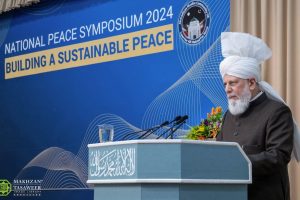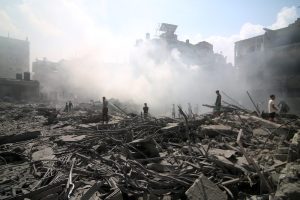
Sarmad Naveed, Canada
Gordan Brown, former Prime Minister of the UK recently said,
‘It is an ethical failure that rich countries have abandoned our moral obligations to the poor.’
He was speaking on behalf of the Access to Covid Tools (ACT) Accelerator, formed by the World Health Organisation (WHO) with the objective of developing tools to combat the Covid-19 pandemic, and deploy things such as tests and vaccines throughout the world.
However, due to a lack of resources and funding, there has been a large discrepancy between rich and poor nations. As Brown puts it:
‘The gap between the vaccinated and protected rich countries, and the unvaccinated and unprotected poor countries, tragically continues to widen.’
The targets are to have 70 percent of a nation’s population vaccinated by mid-2022; whereas 75 percent of people in wealthy nations have been vaccinated, only 10 percent of people in poor countries have received one dose of the vaccine.
This is despite the fact that there have been over 12 billion doses of vaccines made, more than enough to inoculate the world’s entire population. Similarly, of the 4.7 billion Covid tests administered over the course of the pandemic, only 22 million of them have been in poor countries. Thus, there is a visible discrepancy in the allocation and distribution of resources.
It’s for this reason that Brown has called upon wealthy nations to collectively donate $16.8 billion in order to help bring an end to the pandemic. These funds would allow for poor countries to reach the 70 percent vaccination target and be allocated adequate resources for testing and treatment, both for patients and health-care workers.
Yet of the $16.8 billion, a meager $800 million has been donated by wealthy nations collectively.
Dr Ayoade Alakija, WHO Special Envoy for the ACT-Accelerator said,
‘We, as a global community, have been outsmarted by a microbe. It has revealed the cracks in our society. It has shown we are not able to come together with the collectiveness that is needed.’
There are however solutions to filling those cracks in society described by Dr Alakija, namely the discrepancy of resources and wealth between the rich and poor. In fact these solutions have been among us for the last 1400 years.
Take for example the Islamic teaching of Zakat; a mandatory form of alms whereby the wealthy donate a prescribed percentage of their wealth to be distributed among the poor and needy, thereby avoiding the hoarding of wealth. This increases access to wealth and resources for the poor, leading to a just and equitable society. Imagine if the same principle was applied to resourced today.
On one ocassion, God commanded the Holy Prophet (sa) in the Holy Qur’an:
مَاۤ اَفَآءَ اللّٰہُ عَلٰی رَسُوۡلِہٖ مِنۡ اَھۡلِ الۡقُرٰی فَلِلّٰہِ وَلِلرَّسُوۡلِ وَلِذِی الۡقُرۡبٰی وَالۡیَتٰمٰی وَالۡمَسٰکِیۡنِ وَابۡنِ السَّبِیۡلِ ۙ کَیۡ لَا یَکُوۡنَ دُوۡلَۃًۢ بَیۡنَ الۡاَغۡنِیَآءِ مِنۡکُمۡ
‘Whatever Allah has given to His Messenger as spoils from the people of the towns is for Allah and for the Messenger and for the near of kin and the orphans and the needy and the wayfarer, that it may not circulate only among those of you who are rich.’ (59:8)
Hazrat Mirza Bashiruddin Mahmud Ahmad (ra), Second Caliph of the Ahmadiyya Muslim Community explains:
‘A society’s health requires that material goods be widely distributed and wealth be in easy circulation…[the Holy Prophet (sa)] propounded measures that broke the barriers of economic caste and enormously reduced the injustices of special privilege. The main principle of Muslim economics is that the wealth of the people be widely shared.’
Thus, the Holy Prophet (sa) said that the best charity is that which is given by wealthy people [1], signaling the importance of fair and equitable distribution.
Today, the Islamic teachings of equity in order to eliminate the disparity between rich and poor are being championed by the Fifth Caliph and Worldwide Head of the Ahmadiyya Muslim Community, His Holiness, Mirza Masroor Ahmad (aba). Over the years, he has urged world leaders and governments to relinquish their greed and vested interests, and instead focus on the greater good. For example, whilst delivering an address at the Canadian Parliament, His Holiness (aba) said:
‘Whilst developed and richer nations may have chosen to invest in poorer countries, they have prioritised their own vested interests above facilitating the development of those local countries. Rather than exploitation and greed, the developed nations ought to have championed the rights of the weaker nations and sought their advancement. They ought to have sincerely helped the people of those poor nations stand upon their own two feet with dignity and honour.’
Then, whilst delivering an address at Capitol Hillin the United States of America, His Holiness (aba) said:
‘Powerful and rich countries should not usurp the rights of the poor and weaker countries in an effort to preserve their own rights, and nor should they deal with the poorer nations in an unjust fashion.’
As far as the discrepancy of resources in combating the Covid-19 pandemic is concerned, the Caliph (aba) wrote letters addressed to various world leaders, including those being urged by the ACT-Accelerator to donate to poorer nations. In these letters, His Holiness (aba) said:
‘In light of the prevailing circumstances, it is my sincere and humble request that where your government is forming and enacting policies to stop the spread of the coronavirus, as the leader of your nation, you should also encourage the citizens of your country to fulfil the rights of one another and to be ready to make personal sacrifices in the cause of humanity.
Similarly, your government should strive to ensure the peace and security of society, both within your country and at a broader, international level. I sincerely request that you uphold the demands of justice and integrity by seeking to fulfil the rights of your own people and of all other nations.’
His Holiness (aba) further said:
‘If history teaches us anything it is that when governments selfishly prioritise their own national interests over and beyond the collective interest the results are invariably catastrophic.’
As is the case with many of the world’s issues today, Islam has already provided effective and proven solutions. The same is the case with discrepancies between the rich and the poor, which in today’s Covid riddled world, are proving to be a hinderance in collectively coming out of this pandemic. Therefore, not only should wealthy nations do their part in supporting the aims of the ACT-Accelerator, they would be wise to heed the words of the Ahmadiyya Caliph, His Holiness, Mirza Masroor Ahmad (aba).
About the Author: Sarmad Naveed is an Imam of the Ahmadiyya Muslim Community who graduated from the Ahmadiyya Institute for Languages and Theology in Canada. He serves on the Editorial Board of The Review of Religions and coordinates the Facts from Fiction section. He has also appeared as a panelist and host of programmes on Muslim Television Ahmadiyya (MTA) such as ‘Ahmadiyyat: Roots to Branches.’
ENDNOTES
[1]Sahih al-Bukhari Hadith #1426




Add Comment